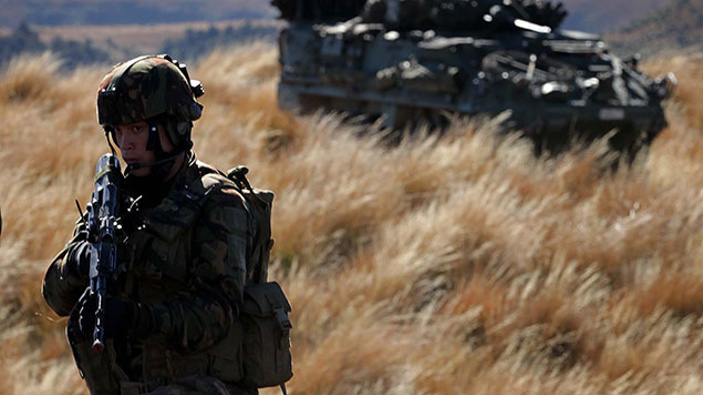I find it incredible that within a few days of a report into the sinking of the Manawanui - a damning report that revealed the crew and the Commanding Officer of the Navy ship were under trained, ill-prepared, not up to the job, the boat wasn't up to the task it was doing when it grounded on a Samoan reef - we learn that the New Zealand Defence Force (NZDF) has lowered its standards to make it easier for people to apply for a job.
This is an RNZ story and documents obtained by RNZ show that last year the Defence Force quietly removed some entry requirements for NCEA levels 1 and 2, which you would have hardly thought were the most onerous of qualifications to get.
To apply to train as an army combat specialist, an auto technician, a plumber, a Navy diver and logistics specialist, and an Air Force firefighter- among other roles - you'll now need three years of high school up to year 11, you don't have to pass Level 1 credits.
The Defence Force says the changes prompted a surge in applications in 2024, however, it's unclear whether that surge is continuing or whether it has had a marked effect on enlistment numbers. The drop in standards - because however you dress it up, that's exactly what it is - came about because people were leaving the army in droves and bosses needed to get boots on the ground however they could.
There's a great piece in North and South Magazine from 2023 looking at just this problem, the attrition within the Army and the decline in standards and the decline in it being an attractive career option. More than one in 10 military personnel left the organisation in 2023. In the interview with North and South, Chief of Defence Force Air Marshall Kevin Short, estimated that the attrition rate for the most skilled personnel was even greater, somewhere between 20 and 30 percent.
So you're losing the experienced people, those who are able to be good leaders, they're going. It's almost certainly higher now. Short said “We cannot sustain that loss.” Then defence Minister Peeni Henare said these are some of the worst rates the Defence Force has seen in its history.
The consequences of that, the Royal New Zealand Navy idled three of its nine ships for lack of people to crew them. A recent briefing to Henare explained that the NZDF was experiencing significant fragility and presumably the new Defence Minister, Judith Collins, has got that briefing as well.
When asked whether Defence Force could maintain a peacekeeping operation in the South Pacific - the organization's most important task after after civil defence - Short says it would struggle. And that's despite the most significant boost to military spending in living memory. However, the boost - that money - was all spent on new planes, ships and vehicles. Money needed to be spent on them, you couldn't keep some of those planes in the air and the dear old Manawanui was bought and that disappeared.
The problems causing the mass exodus of personnel weren't addressed. And that is the poor pay - they're about 7% to 16% percent less than civilian counterparts - substandard housing, the lack of career advancement and the lack of leadership.
So those are the problems, that is why people are leaving. They can't see any way to advance their careers. It used to be a great career option - if you wanted to get you go to university, if you wanted to learn a trade, you'd join the forces, you'd have subsidised housing, you'd put in your service to the country, and in return you'd have a great career. You'd have options after you've done your time. If you decided to leave, you could go into Civvy Street, you'd be snapped up in no time because they knew that training was great, that you'd be a benefit to any organisation.
That's just no longer there. The reason why people are leaving is the poor pay, the substandard housing, the lack of career advancement, the poor leadership. And that simply hasn't been addressed, other than to dumb down, lower and compromise standards. And we've seen what happens when you do that. Loose lips might sink ships, but so too do loose standards and loose training.
Take your Radio, Podcasts and Music with you










